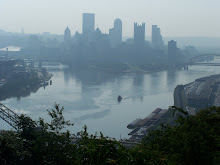Tues., July 29
Barbara Tischler, who handles the curriculum development at Horace Mann and occasionally also teaches history there, followed up the lecture on the Harlem Renaissance with one on the Civil Rights Movement. Her presentation focused more on the music rather than on the history we got yesterday.
She went through the musicians who led up to the civil rights songs: the Fisk Jubilee Singers with their very European performance of “Down by the Riverside”, Johnson’s “Lift Every Voice”, and Paul Robeson’s “Didn’t my Lord Delivery Daniel?” (all mentioned yesterday as part of the Harlem Renaissance). Everyone got excited for the Golden Gate Jubilee Quartet’s performance of “Jezebel”. Ben was nodding to the beat, Ashley was shaking her shoulders, Deane was shaking his head with his eyes closed with Barbara Tischler herself mouthing the words.
Tischler began talking about the Civil Rights Movement with the Albany Movement in the spring of 1962. The Albany Movement was one of the places where music came to play an important role. It was where “We shall overcome”, first introduced by a white guy from California, became a rallying cry for the movement. And it was out of Albany that the Freedom Singers first emerged; the Freedom Singers was the male/female quartet that gained fame touring the college campuses across the country signing songs like “We Shall Overcome” and “This Little Light of Mine”.
She suggested a role-playing activity where students enact a lunch counter sit-in with various students playing waitresses, protesters, restaurant managers, police officers, etc. It sounded like a great activity but a potentially volatile one that would need to be managed and set up properly.
We spent a lot of time talking about Medgar Evers, the state secretary of the NAACP who was killed one night while out for a walk. There is a wealth of literature and song available on this important historical event: Bob Dylan’s “Only a Pawn in Their Game”, “Medgar Evers Lullaby” performed by Judy Collins, Phil Ochs’ “Here’s to the State of Mississippi” (related because Evers’ murder occurred in Mississippi), and even a short story by Eudora Welty entitled “Where is the Voice Coming From?”
She ended with a few songs that, while probably not within the historical period we think of as Civil Rights period, continues the legacy of the civil rights protest movement. Songs like James Browns’ “Say it loud, I’m black and proud” (1968), a song which had Joel shaking his whole torso and which the kids would love; songs like “The Revolution Will not be Televised”, a poem which I’ve always wanted to do in the classroom but which Tischler warned is a difficult one because it is filled with references that the kids don’t know.
One thing was certain as she closed her lecture. I need to get a copy of “Eyes on the Prize”, the recently-released PBS video on the civil rights protest movement.
Barbara Tischler, who handles the curriculum development at Horace Mann and occasionally also teaches history there, followed up the lecture on the Harlem Renaissance with one on the Civil Rights Movement. Her presentation focused more on the music rather than on the history we got yesterday.
She went through the musicians who led up to the civil rights songs: the Fisk Jubilee Singers with their very European performance of “Down by the Riverside”, Johnson’s “Lift Every Voice”, and Paul Robeson’s “Didn’t my Lord Delivery Daniel?” (all mentioned yesterday as part of the Harlem Renaissance). Everyone got excited for the Golden Gate Jubilee Quartet’s performance of “Jezebel”. Ben was nodding to the beat, Ashley was shaking her shoulders, Deane was shaking his head with his eyes closed with Barbara Tischler herself mouthing the words.
Tischler began talking about the Civil Rights Movement with the Albany Movement in the spring of 1962. The Albany Movement was one of the places where music came to play an important role. It was where “We shall overcome”, first introduced by a white guy from California, became a rallying cry for the movement. And it was out of Albany that the Freedom Singers first emerged; the Freedom Singers was the male/female quartet that gained fame touring the college campuses across the country signing songs like “We Shall Overcome” and “This Little Light of Mine”.
She suggested a role-playing activity where students enact a lunch counter sit-in with various students playing waitresses, protesters, restaurant managers, police officers, etc. It sounded like a great activity but a potentially volatile one that would need to be managed and set up properly.
We spent a lot of time talking about Medgar Evers, the state secretary of the NAACP who was killed one night while out for a walk. There is a wealth of literature and song available on this important historical event: Bob Dylan’s “Only a Pawn in Their Game”, “Medgar Evers Lullaby” performed by Judy Collins, Phil Ochs’ “Here’s to the State of Mississippi” (related because Evers’ murder occurred in Mississippi), and even a short story by Eudora Welty entitled “Where is the Voice Coming From?”
She ended with a few songs that, while probably not within the historical period we think of as Civil Rights period, continues the legacy of the civil rights protest movement. Songs like James Browns’ “Say it loud, I’m black and proud” (1968), a song which had Joel shaking his whole torso and which the kids would love; songs like “The Revolution Will not be Televised”, a poem which I’ve always wanted to do in the classroom but which Tischler warned is a difficult one because it is filled with references that the kids don’t know.
One thing was certain as she closed her lecture. I need to get a copy of “Eyes on the Prize”, the recently-released PBS video on the civil rights protest movement.

























No comments:
Post a Comment